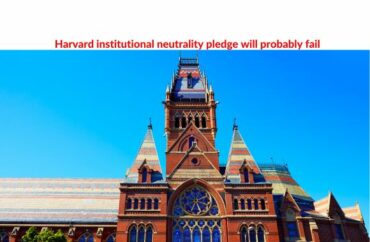
OPINION: University leaders have previously claimed national events affected core activities
Harvard University’s new “institutional neutrality” policy will probably fail, based on the school’s own history.
The university announced earlier this week it would refrain from issuing “official statements about public matters that do not directly affect the university’s core function.”
The announcement came from the university’s Institutional Voice Working Group.
While it sounds good, my guess is the university will find national political events have a relationship, even if wobbly, to the school’s “core function.”
In May 2020, then-Dean Claudine Gay connected the killing of George Floyd to the work done by the Faculty of Arts and Sciences.
Commenting on the need to fight racism, Gay stated:
Part of that change is the work we do here to learn and listen across lines of difference and to build a community grounded in trust and respect. Part of that change is our work to trace the roots of inequality and its pernicious effects and to equip our students with the understanding and insight needed to create a better world. Now is the time to lean into our mission, with resolve and a new sense of urgency.
“We do,” “our work,” “our students,” and “our mission,” are all phrases indicating Gay thought the killing of a black man by Minneapolis police had a direct connection to the “core function” of the arts and sciences faculty of a Massachusetts university.
On January 7, 2021, the day after the violence at the U.S. Capitol, Harvard President Lawrence Bacow found a way to insert Harvard into a situation 463 miles away.
“As members of a university community dedicated to truth, learning, research, debate, and service, we condemn ignorance and hatred, and stand in support of the rule of law and the role of knowledge,” Bacow wrote.
Harvard Medical School also has an institutional stance on abortion, though it is unclear why killing innocent preborn babies in the womb is part of the “core function,” of the university.
“At the Center for Primary Care, we believe in a person’s right to choose what is best for their body,” it wrote after the reversal of Roe v. Wade in June 2022. “We believe the right to safe and accessible abortion services is a matter of equity, which is a crucial part of the mission of our Center.”
MORE: UMich funds ideological research while saying it wants ‘diversity of thought’
Again, “the mission of our Center,” sounds like a synonym for “core function.”
There is another problem on the horizon – the university’s attempt to separate actions from statements.
Divestment is not a “statement in words,” working group member Noah Feldman said, as reported by The Harvard Crimson, keeping the door open for the university to divest from Israel.
But actions are how people show their values. Attending a church, voting for a candidate, or boycotting certain companies are all ways to make statements and display values.
The other way university leaders may get around the prohibition is following the example of nonprofit leaders who endorse candidates in their “personal capacity.”
Harvard’s new president could simply say that he wants Trump to lose, supports abortion, or backs a climate change agreement, “in his personal capacity.”
It would not prevent a media outlet from accurately stating that “Harvard’s president says he wants Trump to lose.” The message would be clear.
Institutional neutrality, when implemented, can be positive for a university. Higher education institutions should have missions and stick to them.
But so far, Harvard has shown it believes commenting on a variety of political topics is a “core function” of its mission.
MORE: ASU still asks for DEI commitment despite board directive banning it
IMAGE: Luna Marina/Canva Pro; College Fix edits
Like The College Fix on Facebook / Follow us on Twitter







Please join the conversation about our stories on Facebook, Twitter, Instagram, Reddit, MeWe, Rumble, Gab, Minds and Gettr.